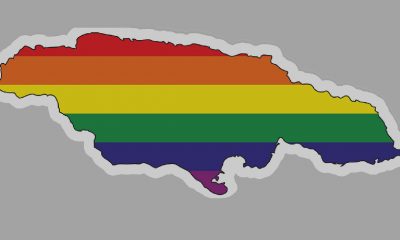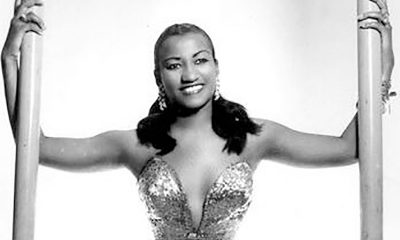News
Salir de las redes sociales a las calles
Activistas independientes en Cuba usan métodos innovadores
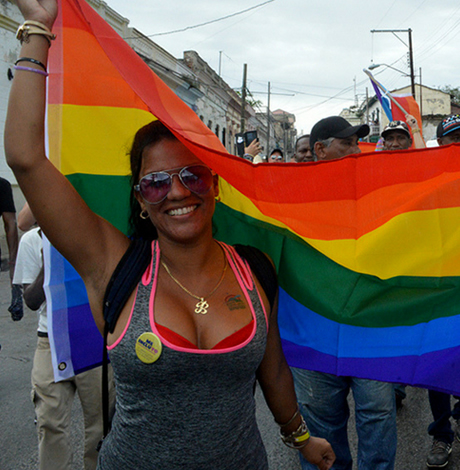
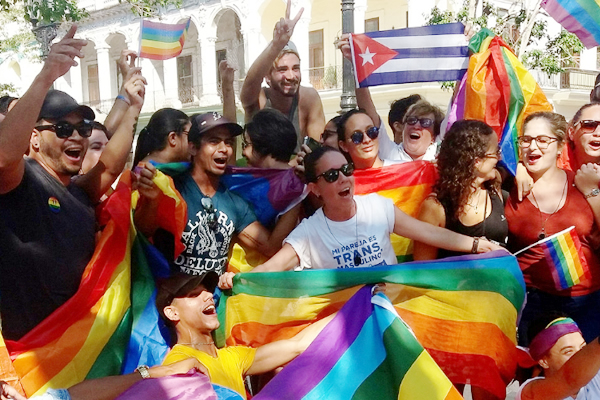
Un grupo de activistas por los derechos LGBTI+ en Prado y Malecón en La Habana el pasado 27 de octubre. (Foto cortesía de Jimmy Roque Martínez)
Nota del editor: Tremenda Nota es una revista electrónica independiente que documenta la comunidad LGBTI+ del país y otros grupos minoritarios. Tremenda Nota es una pareja de contenido del Washington Blade.
Esa nota salió originalmente en el sitio web de Tremenda Nota.
LA HABANA — Mientras las iglesias se oponen a la aprobación del matrimonio igualitario en Cuba y el Cenesex mantiene una postura pública discreta, los activistas LGBTI+ — menos organizados que las instituciones religiosas ― promueven campañas en diferentes soportes y medios.
A las tres de la tarde del 27 de octubre de 2018, en la intersección de Prado y Malecón, La Habana, debía celebrarse una besada — o Besuqueo, como le llamaron sus organizadoras — en apoyo al matrimonio igualitario. Unas horas antes habían confirmado su asistencia más de 600 personas y la invitación había sido compartida un centenar de veces en redes sociales. “Sacar los besos del clóset” era la divisa.
Durante el Besuqueo el Proyecto Abriendo Brechas de Colores (ABC) — LGTBI — un grupo que busca “generar espacios de diálogo entre los discursos religiosos y sociales en torno a los derechos de las mujeres y las personas LGBTIQ+” ― entregaría folletos sobre el fundamentalismo religioso, así como carteles y pegatinas alegóricos a la diversidad sexual y de género.
ABC también planeaba proyectar videos producidos en la campaña Todos los derechos para todas las familias. Los besos más creativos quedarían plasmados en una sesión de fotos. En esa zona del Prado se “izarían” banderas de la diversidad.
Sin embargo, un día antes de la cita ABC canceló públicamente el Besuqueo por no recibir el permiso estatal para tomar la calle.
Pese a la suspensión, a la hora y el día previstos hubo un flash mob (movilización relámpago) en Prado y Malecón. Acudieron las organizadoras del evento y otros activistas vinculados al Centro Nacional de Educación Sexual (Cenesex). Se besaron.
El Besuqueo no trascendió más: Asistieron unas 30 personas, en lugar de la multitud que podía haber acudido.
La cancelación del evento y la actitud reticente de sus promotoras generaron críticas de varios activistas en las redes sociales. El poeta Norge Espinosa resumió su decepción así: “El activismo de veras se hace con arrojo, con la disposición precisa a ir más allá de los límites permitidos, o no se hace”.
Paradójicamente, dos días antes de que ABC cancelara el Besuqueo, la Iglesia Metodista de Marianao reunió unos 3.500 feligreses en los alrededores del templo para mostrar su desacuerdo con el matrimonio igualitario, según informó la propia institución en su página de Facebook. Celebraron un culto multitudinario, sin permiso de nadie.
Iglesias versus activistas
Hasta ahora las iglesias cubanas han mantenido una postura firme en contra del matrimonio igualitario y “la ideología de género” en las páginas institucionales de sus redes sociales.
Pero su activismo también ha traspasado las fronteras del mundo virtual. Los feligreses han distribuido a lo largo del país carteles y pegatinas que defienden el “diseño original de la familia, como Dios la creó”. También se han manifestado en las calles aledañas a sus templos y, como si fuera poco, han “publicado” sus mensajes en el “paquete semanal”, la variante cubana a la internet.
Ahora quieren llegar más lejos. La reverenda Alida León, presidenta de la Liga Evangélica de Cuba, confirmó a Tremenda Nota que una veintena de denominaciones recogen firmas contra el artículo 68. “No tenemos nada en contra de los homosexuales, pero exigimos que se conserve el concepto de matrimonio como Dios lo creó”.
En efecto, el pasado 13 de noviembre más de una decena de denominaciones cristianas hicieron pública una carta enviada a la “Comisión Constitutiva del del Proyecto de Constitución, Comité Central del PCC”. Las 13 iglesias que suscriben el documento aseguran haber recogido casi 180.000 firmas contra la modificación del concepto de matrimonio en el proyecto de Carta Magna.
La comunidad cristiana podría votar No en el próximo referendo si se mantiene el artículo 68 en el Proyecto de Constitución. En su texto “El artículo 68: Evangélicos, católicos, el movimiento LGBTI y las cortinas de humo” el intelectual y activista Alberto Abreu Arcia asegura que León Báez, uno de los líderes de la iglesia evangélica en Cuba, declaró: “Si no se modifica el tema del matrimonio en el proyecto de Constitución todo votaremos en contra”.
De acuerdo con el Instituto Patmos en 2017 el 10 por ciento de la población cubana profesaba la fe evangélica, mientras que un 35 por ciento se consideraba nominalmente católico. Las denominaciones cristianas están organizadas y tienen presencia a lo largo del archipiélago cubano. Disponen de locales de reunión y de mecanismos de comunicación directa con el Estado. Por ende, el activismo independiente tiene menos ventaja en esta “contienda”.
Muchos defensores de los derechos LGBTI+ en Cuba han tenido que seguir el guión trazado por el Cenesex: Desfilan en mayo a paso de conga y luego regresan a las redes sociales, donde se acumulan denuncias, mensajes y campañas. A las calles no se puede llegar sin la anuencia del Gobierno.
“Las redes sociales y los entornos digitales han venido a suplir las carencias de legitimidad en otros espacios, pero no permiten dar respuesta a todos los desafíos”, explica a Tremenda Nota el joven activista Yadiel Cepero.
“En aras de transformar el estado actual de cosas creo, como muchos otros activistas, que se debe impulsar la agenda LGBTI+ a la par que se impulsan los derechos civiles y políticos. De manera que los colectivos puedan legalizarse, articularse, disponer de espacios de reunión y hacer uso de mecanismos de participación e incidencia política”, asegura Cepero.
Para el fundador de la plataforma de discusión Construyendo una agenda de la diversidad sexual en Cuba, el primer paso de los defensores de los derechos LGBTI+ sería arriesgarse a tomar el espacio público. “La iglesia puso sus carteles y no pasó nada. ¿A qué le tenemos miedo?”
Sin embargo, durante los debates constitucionales un sector del activismo cubano se ha mantenido a la zaga de las iglesias, confiado en el papel del Estado como garante de derechos.
“Tenemos una herencia fuerte de inactividad, de miedo. Muchas veces porque no nos han dejado caminar solos”, asegura la activista y abogada Lidia Romero. “Hemos llegado a un momento importante para impulsar derechos y justo ahora parece que no sabemos qué hacer, ni cómo organizarnos.”
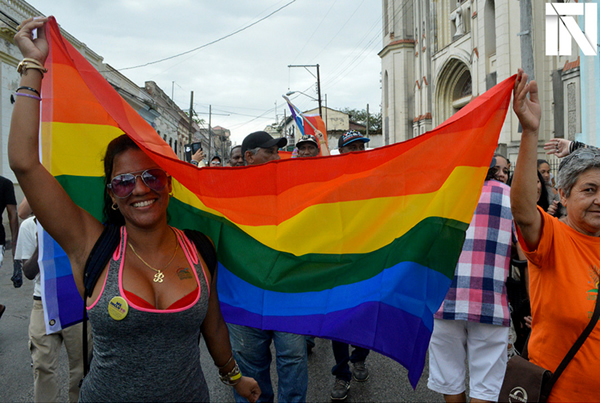
Solo el 17 de mayo ―Día mundial de la lucha contra la homofobia y la transfobia― el Gobierno, a través del Cenesex, autoriza que los activistas, personas LGBTI+ o simpatizantes de la causa de los derechos sexuales marchen. (Foto por Yariel Valdés González)
Algunos activistas creen inevitable la aprobación del artículo 68 y, por tanto, asumen que sería ocioso replicar a los grupos religiosos. El periodista Francisco Rodríguez Cruz aseguró en su blog Paquito el de Cuba que no debe temerse a que “la matriz de opinión conservadora de algunas iglesias pueda imponerse al resto de la sociedad”.
El bloguero explica que los resultados de la consulta popular no los definirá la cantidad de firmas que reúnan las iglesias ni el número de planteamientos en contra del artículo 68, “sino el análisis de la pertinencia o no de cada propuesta que surja del debate, por parte de la comisión redactora del proyecto constitucional y del Parlamento que aprobará el texto definitivo antes del referendo”.
La opinión de Rodríguez Cruz se apoya en las declaraciones del Secretario del Consejo de Estado, Homero Acosta Álvarez. El pasado 17 de octubre, durante la inauguración del Congreso Internacional Abogacía 2018, el jurista dijo: “El Derecho no puede permanecer esclavo perpetuo de rezagos sociales, aún cuando en un momento pueda entrar en colisión con parte del espectro social. En su misión transformadora le corresponde también impulsar el desarrollo”.
‘Vamos a convocar nuevas besadas’
En las últimas semanas varios activistas han puesto a circular en las redes sociales videos cortos donde personas LGBTI+ (o no) muestran su apoyo al artículo 68 del Proyecto de Constitución.
Las páginas 68Va, Acepto, Por el matrimonio igualitario en Cuba, Proyecto Abriendo Brechas de Colores – LGTBI, Construyendo una agenda de la diversidad sexual en Cuba e Iglesia de la Comunidad Metropolitana en Cuba (ICM) llevan adelante diferentes campañas en las redes sociales. También se suman varios cibernautas desde sus perfiles personales o sus blogs.
Sin embargo, las propuestas o campañas generadas en estas plataformas digitales no logran trascender el espacio virtual en un país cuya población mayoritaria permanece desconectada.
Unos meses atrás, el 11 de mayo, una veintena de intelectuales y activistas cubanos publicaron una detallada agenda por los derechos LGBTI+ en Cuba. El documento — primero de su tipo en el país — incluye 63 demandas específicas y se divide en dos grandes secciones: medidas legislativas y políticas, planes y estrategias. Todos sus firmantes son miembros de la sociedad civil.
Algunos de los suscriptores son activistas que buscan alternativas independientes del Estado o el Cenesex para encauzar sus demandas.
“(El Cenesex) es una institución que excluye a quienes no concuerdan con sus ideas políticas, tampoco socializa los avances de su labor, sino que nos pide confiar en que ʻestán trabajandoʼ, sin tener más información que esto. No nos trata como iguales, ni como parte”, agrega Lidia Romero.
Recientemente, la activista Sandra Álvarez Ramírez, otrora webmaster del Cenesex y miembro del consejo editorial de la revista Sexología y Sociedad, fue replicada por el perfil de Facebook de la institución. “Los ʻperiodistas de verdadʼ no recibimos instrucciones desde Berlín”, escribió Cenesex cuando la psicóloga cubana residente en Alemania preguntó sobre la cancelación del Besuqueo.
Para varios militantes el panorama actual empeora por la falta de articulación de un movimiento LGBTI+ en Cuba. “Si tú no tienes espacios de socialización, ni de accionar, ni una institución que te represente como un todo, y ni siquiera puedes asociarte legalmente, entonces no hay trabajo articulado, pero debemos vencer esos límites”, termina Romero.
Menos unidos, más rezagados que las iglesias, los activistas comienzan a salir discretamente de las redes, empiezan a saber que les corresponde emplazar al Estado, a las instituciones y a una parte de la sociedad negada a que todas las personas alcancen todos los derechos.
Jimmy Roque Martínez — uno de ellos — no cree que los simpatizantes con la causa de los derechos sexuales deban mantenerse esperando los resultados del referendo constitucional con discreción. “Además de las historias de vida y opiniones que comenzaron a circular en las redes sociales, y las páginas creadas también vamos a convocar nuevas besadas, solo que estas no van a cancelarse”, augura.
Ecuador
Justicia reconoce delito de odio en caso de bullying en Instituto Nacional Mejía de Ecuador
Johana B se suicidó el 11 de abril de 2023

A casi tres años del suicidio de Johana B., quien estudió en el Instituto Nacional Mejía, colegio emblemático de Quito, el Tribunal de la Corte Nacional de Justicia ratificó la condena para el alumno responsable del acoso escolar que la llevó a quitarse la vida.
Según información de la Fiscalía, el fallo de última instancia deja en firme la condena de cuatro años de internamiento en un centro para adolescentes infractores, en una audiencia de casación pedida por la defensa del agresor, tres meses antes de que prescriba el caso.
Con la sentencia, este caso es uno de los primeros en el país en reconocer actos de odio por violencia de género, delito tipificado en el artículo 177 del Código Orgánico Penal Integral (COIP).
El suicidio de Johana B. ocurrió el 11 abril de 2023 y fue consecuencia del acoso escolar por estereotipos de género que enfrentó la estudiante por parte de su agresor, quien constantemente la insultaba y agredía por su forma de vestir, llevar el cabello corto o practicar actividades que hace años se consideraban exclusivamente para hombres, como ser mando de la Banda de Paz en el Instituto Nacional Mejía.
Desde la muerte de Johana, su familia buscaba justicia. Su padre, José, en una entrevista concedida a edición cientonce para la investigación periodística Los suicidios que quedan en el clóset a causa de la omisión estatal afirmó que su hija era acosada por su compañero y otres estudiantes con apodos como “marimacha”, lo que también fue corroborado en los testimonios recogidos por la Unidad de Justicia Juvenil No. 4 de la Fiscalía.
Los resultados de la autopsia psicológica y del examen antropológico realizados tras la muerte de Johana confirmaron las versiones de sus compañeras y docentes: que su agresor la acosó de manera sistemática durante dos años. Los empujones, jalones de cabello o burlas, incluso por su situación económica, eran constantes en el aula de clase.
La violencia que recibió Johana escaló cuando su compañero le dio un codazo en la espalda ocasionándole una lesión que le imposibilitó caminar y asistir a clases.
Días después del hecho, la adolescente se quitó la vida en su casa, tras escuchar que la madre del agresor se negó a pagar la mitad del valor de una tomografía para determinar la lesión en su espalda, tal como lo había acordado previamente con sus padres y frente al personal del DECE (Departamento de Consejería Estudiantil del colegio), según versiones de su familia y la Fiscalía.
#AFONDO | Johana se suicidó el 11 de abril de 2023, tras ser víctima de acoso escolar por no cumplir con estereotipos femeninos 😢.
Dos semanas antes, uno de sus compañeros le dio un codazo en la espalda, ocasionándole una lesión que le imposibilitó caminar 🧵 pic.twitter.com/bXKUs9YYOm
— EdicionCientonce (@EdCientonce) September 3, 2025
“Era una chica linda, fuerte, alegre. Siempre nos llevamos muy bien, hemos compartido todo. Nos dejó muchos recuerdos y todos nos sentimos tristes; siempre estamos pensando en ella. Es un vacío tan grande aquí, en este lugar”, expresó José a Edición Cientonce el año pasado.
Para la fiscal del caso y de la Unidad de Justicia Juvenil de la Fiscalía, Martha Reino, el suicidio de la adolescente fue un agravante que se contempló durante la audiencia de juzgamiento de marzo de 2024, según explicó a este medio el año pasado. Desde entonces, la familia del agresor presentó un recurso de casación en la Corte Nacional de Justicia, que provocó la dilatación del proceso.
En el fallo de última instancia, el Tribunal también dispuso que el agresor pague $3.000 a la familia de Johana B. como reparación integral. Además, el adolescente deberá recibir medidas socioeducativas, de acuerdo al artículo 385 del Código Orgánico de la Niñez y Adolescencia, señala la Fiscalía.
El caso de Johana también destapó las omisiones y negligencias del personal del DECE y docentes del Instituto Nacional Mejía. En la etapa de instrucción fiscal se comprobó que no se aplicaron los protocolos respectivos para proteger a la víctima.
De hecho, la Fiscalía conoció el caso a raíz de la denuncia que presentó su padre, José, y no por el DECE, aseguró la fiscal el año pasado a Edición Cientonce.
Pese a estas omisiones presentadas en el proceso, el fallo de última instancia sólo ratificó la condena para el estudiante.
U.S. Military/Pentagon
4th Circuit rules against discharged service members with HIV
Judges overturned lower court ruling

A federal appeals court on Wednesday reversed a lower court ruling that struck down the Pentagon’s ban on people with HIV enlisting in the military.
The conservative three-judge panel on the 4th U.S. Circuit Court of Appeals overturned a 2024 ruling that had declared the Defense Department and Army policies barring all people living with HIV from military service unconstitutional.
The 4th Circuit, which covers Maryland, North Carolina, South Carolina, Virginia, and West Virginia, held that the military has a “rational basis” for maintaining medical standards that categorically exclude people living with HIV from enlisting, even those with undetectable viral loads — meaning their viral levels are so low that they cannot transmit the virus and can perform all duties without health limitations.
This decision could have implications for other federal circuits dealing with HIV discrimination cases, as well as for nationwide military policy.
The case, Wilkins v. Hegseth, was filed in November 2022 by Lambda Legal and other HIV advocacy groups on behalf of three individual plaintiffs who could not enlist or re-enlist based on their HIV status, as well as the organizational plaintiff Minority Veterans of America.
The plaintiffs include a transgender woman who was honorably discharged from the Army for being HIV-positive, a gay man who was in the Georgia National Guard but cannot join the Army, and a cisgender woman who cannot enlist in the Army because she has HIV, along with the advocacy organization Minority Veterans of America.
Isaiah Wilkins, the gay man, was separated from the Army Reserves and disenrolled from the U.S. Military Academy Preparatory School after testing positive for HIV. His legal counsel argued that the military’s policy violates his equal protection rights under the Fifth Amendment’s Due Process Clause.
In August 2024, a U.S. District Court sided with Wilkins, forcing the military to remove the policy barring all people living with HIV from joining the U.S. Armed Services. The court cited that this policy — and ones like it that discriminate based on HIV status — are “irrational, arbitrary, and capricious” and “contribute to the ongoing stigma surrounding HIV-positive individuals while actively hampering the military’s own recruitment goals.”
The Pentagon appealed the decision, seeking to reinstate the ban, and succeeded with Wednesday’s court ruling.
Judge Paul V. Niemeyer, one of the three-judge panel nominated to the 4th Circuit by President George H. W. Bush, wrote in his judicial opinion that the military is “a specialized society separate from civilian society,” and that the military’s “professional judgments in this case [are] reasonably related to its military mission,” and thus “we conclude that the plaintiffs’ claims fail as a matter of law.”
“We are deeply disappointed that the 4th Circuit has chosen to uphold discrimination over medical reality,” said Gregory Nevins, senior counsel and employment fairness project director for Lambda Legal. “Modern science has unequivocally shown that HIV is a chronic, treatable condition. People with undetectable viral loads can deploy anywhere, perform all duties without limitation, and pose no transmission risk to others. This ruling ignores decades of medical advancement and the proven ability of people living with HIV to serve with distinction.”
“As both the 4th Circuit and the district court previously held, deference to the military does not extend to irrational decision-making,” said Scott Schoettes, who argued the case on appeal. “Today, servicemembers living with HIV are performing all kinds of roles in the military and are fully deployable into combat. Denying others the opportunity to join their ranks is just as irrational as the military’s former policy.”
New York
Lawsuit to restore Stonewall Pride flag filed
Lambda Legal, Washington Litigation Group brought case in federal court

Lambda Legal and Washington Litigation Group filed a lawsuit on Tuesday, challenging the Trump-Vance administration’s removal of the Pride flag from the Stonewall National Monument in New York earlier this month.
The suit, filed in the U.S. District Court for the Southern District of New York, asks the court to rule the removal of the Pride flag at the Stonewall National Monument is unconstitutional under the Administrative Procedures Act — and demands it be restored.
The National Park Service issued a memorandum on Jan. 21 restricting the flags that are allowed to fly at National Parks. The directive was signed by Trump-appointed National Park Service Acting Director Jessica Bowron.
“Current Department of the Interior policy provides that the National Park Service may only fly the U.S. flag, Department of the Interior flags, and the Prisoner of War/Missing in Action flag on flagpoles and public display points,” the letter from the National Park Service reads. “The policy allows limited exceptions, permitting non-agency flags when they serve an official purpose.”
That “official purpose” is the grounds on which Lambda Legal and the Washington Litigation Group are hoping a judge will agree with them — that the Pride flag at the Stonewall National Monument, the birthplace of LGBTQ rights movement in the U.S., is justified to fly there.
The plaintiffs include the Gilbert Baker Foundation, Charles Beal, Village Preservation, and Equality New York.
The defendants include Interior Secretary Doug Burgum; Bowron; and Amy Sebring, the Superintendent of Manhattan Sites for the National Park Service.
“The government’s decision is deeply disturbing and is just the latest example of the Trump administration targeting the LGBTQ+ community. The Park Service’s policies permit flying flags that provide historical context at monuments,” said Alexander Kristofcak, a lawyer with the Washington Litigation Group, which is lead counsel for plaintiffs. “That is precisely what the Pride flag does. It provides important context for a monument that honors a watershed moment in LGBTQ+ history. At best, the government misread its regulations. At worst, the government singled out the LGBTQ+ community. Either way, its actions are unlawful.”
“Stonewall is the birthplace of the modern LGBTQ+ rights movement,” said Beal, the president of the Gilbert Baker Foundation. The foundation’s mission is to protect and extend the legacy of Gilbert Baker, the creator of the Pride flag.
“The Pride flag is recognized globally as a symbol of hope and liberation for the LGBTQ+ community, whose efforts and resistance define this monument. Removing it would, in fact, erase its history and the voices Stonewall honors,” Beal added.
The APA was first enacted in 1946 following President Franklin D. Roosevelt’s creation of multiple new government agencies under the New Deal. As these agencies began to find their footing, Congress grew increasingly worried that the expanding powers these autonomous federal agencies possessed might grow too large without regulation.
The 79th Congress passed legislation to minimize the scope of these new agencies — and to give them guardrails for their work. In the APA, there are four outlined goals: 1) to require agencies to keep the public informed of their organization, procedures, and rules; 2) to provide for public participation in the rule-making process, for instance through public commenting; 3) to establish uniform standards for the conduct of formal rule-making and adjudication; and 4) to define the scope of judicial review.
In layman’s terms, the APA was designed “to avoid dictatorship and central planning,” as George Shepherd wrote in the Northwestern Law Review in 1996, explaining its function.
Lambda Legal and the Washington Litigation Group are arguing that not only is the flag justified to fly at the Stonewall National Monument, making the directive obsolete, but also that the National Park Service violated the APA by bypassing the second element outlined in the law.
“The Pride flag at the Stonewall National Monument honors the history of the fight for LGBTQ+ liberation. It is an integral part of the story this site was created to tell,” said Lambda Legal Chief Legal Advocacy Officer Douglas F. Curtis in a statement. “Its removal continues the Trump administration’s disregard for what the law actually requires in their endless campaign to target our community for erasure and we will not let it stand.”
The Washington Blade reached out to the NPS for comment, and received no response.
-

 Baltimore4 days ago
Baltimore4 days ago‘Heated Rivalry’ fandom exposes LGBTQ divide in Baltimore
-

 Real Estate4 days ago
Real Estate4 days agoHome is where the heart is
-

 District of Columbia4 days ago
District of Columbia4 days agoDeon Jones speaks about D.C. Department of Corrections bias lawsuit settlement
-

 European Union4 days ago
European Union4 days agoEuropean Parliament resolution backs ‘full recognition of trans women as women’

